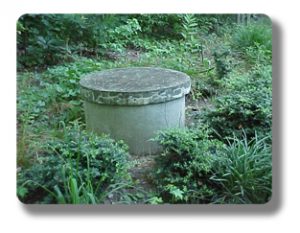History Government Links Earthquakes
Purpose
This page is intended to provide private well owners with information about private well water in Virginia. In keeping with the Department’s mission to protect and promote the health of all Virginians, the Division of Onsite Sewage and Water Services recognizes the importance of potable drinking water from private wells for personal and public health.
The mission of the Division is to protect public health and ground water quality. This is best achieved by implementing an onsite wastewater and private well program based on sound scientific, engineering, and public health principles. We also strive to maintain effective communication in the onsite and private well water community, and the division is using this website as one method to keep interested parties informed on new developments, regulations, and policy decisions.
As an owner of a private well or someone interested in drinking water in general, the Division hopes you’ll find this information to be useful.
Overview: Wells in Virginia
The majority of households in 60 of Virginia’s 95 counties rely on private water supply systems. In 52 counties, the number of households using private wells is increasing faster than the number of households connecting to public water supply systems. Heaviest reliance on private water supply systems is outside urban centers in rural, non-agricultural areas, where new growth occurs beyond the extent of public water or sewer lines. Of the more than one million households in Virginia using private wells, 92 percent also use septic systems. (VADEQ, 2007,http://www.deq.virginia.gov/gwpsc)
Managing the Risks
Most of the time, we turn on the tap and don’t think about where the water comes from. We often take for granted that our homes have safe, reliable water for use in the kitchen, laundry, bathroom, and garden.
Is the water safe to drink? Water supplied by a utility or municipality is regularly tested to make sure that it meets drinking standards. In a home with a private well, it is the homeowner’s responsibility to test the water. Testing once a year is a good idea. Homes with a well and public supply must never connect the two systems.
If you use water conditioner equipment, it should be maintained and kept in good working order. Most wells do not require chemicals for treatment but the only way to know the quality of the water is by regular testing. The soil does an effective job of naturally cleansing harmful organisms from rainwater some of which will recharge drinking water aquifers. Deep ground water is more likely to be free from organisms than water from shallow wells because of longer travel times. Untreated surface water from a lake or river almost always contains bacteria and other organisms.
Some threats to groundwater include: factories an industries; agricultural areas; trash and toxic materials; leaking underground storage tanks; malfunctioning septic systems; road salt; waste oil; and garden chemicals. Individual behavior can impact ground water quality and consequently, private well water. One must always dispose of hazardous materials and chemicals in an appropriate and safe manner and never on your property which could impact the drinking water aquifer. Most landfills or transfer stations accommodate the safe recycling of hazardous materials such as paint, solvents, batteries, and cleaning products. Contaminants on the ground surface and in the soil may be picked up by rainfall and through infiltration and runoff affect the quality of groundwater.
All Virginians should be concerned about groundwater protection and private well owners need to be vigilant about threats to their water supply. The Virginia Department of Health recommends that private well owners consider treatment or investigate alternative sources if they find contaminants in their well exceeding any Primary Maximum Contaminant Levels (PMCL) as found at Environmental Protection Agency’s Primary Maximum Contaminant Level.
The National Ground Water Association recommends well owners test the water:
- Annually for bacteria, nitrates/nitrites, and any other contaminants of local concern.
- More frequently than once a year if there is a change in the taste, odor, or appearance of the well water, or if a problem occurs such as a broken well caps or a new contamination source appears.
- If family members or houseguests have recurrent incidents of gastrointestinal illness.
- If an infant is living in the home.
- If you wish to monitor the efficiency and performance of home water treatment equipment.
It is important that you make informed decisions about a precious resource that’s closely linked to your personal health and is a major component of your home and property. Please take advantage of this information to make an informed decision about your private well water.
Follow the links below to find more information about water quality in private water wells.
- Virginia Household Water Quality Program
- The Virginia Household Water Quality Program provides practical information to homeowners about maintaining and protecting private water systems such as wells, spring and cisterns.
- Wellowner.org
- Wellowner.org is your one-stop resource for information relating to private water well systems and ground water. Throughout, the importance of regular well maintenance and water testing is demonstrated again and again. After all, your water well system is a direct link to an underground water reserve and the responsibility is yours to protect this valuable natural resource, as well as safeguarding your family’s health. The investment in proper testing and maintenance is more than worth it!
- Water Systems Council Hotline
- Water Systems Council (WSC) is the only national, nonprofit organization solely focused on household wells and small water well systems. WSC is committed to ensuring that Americans who get their water from household, private wells have safe, affordable drinking water and to protecting groundwater resources.
